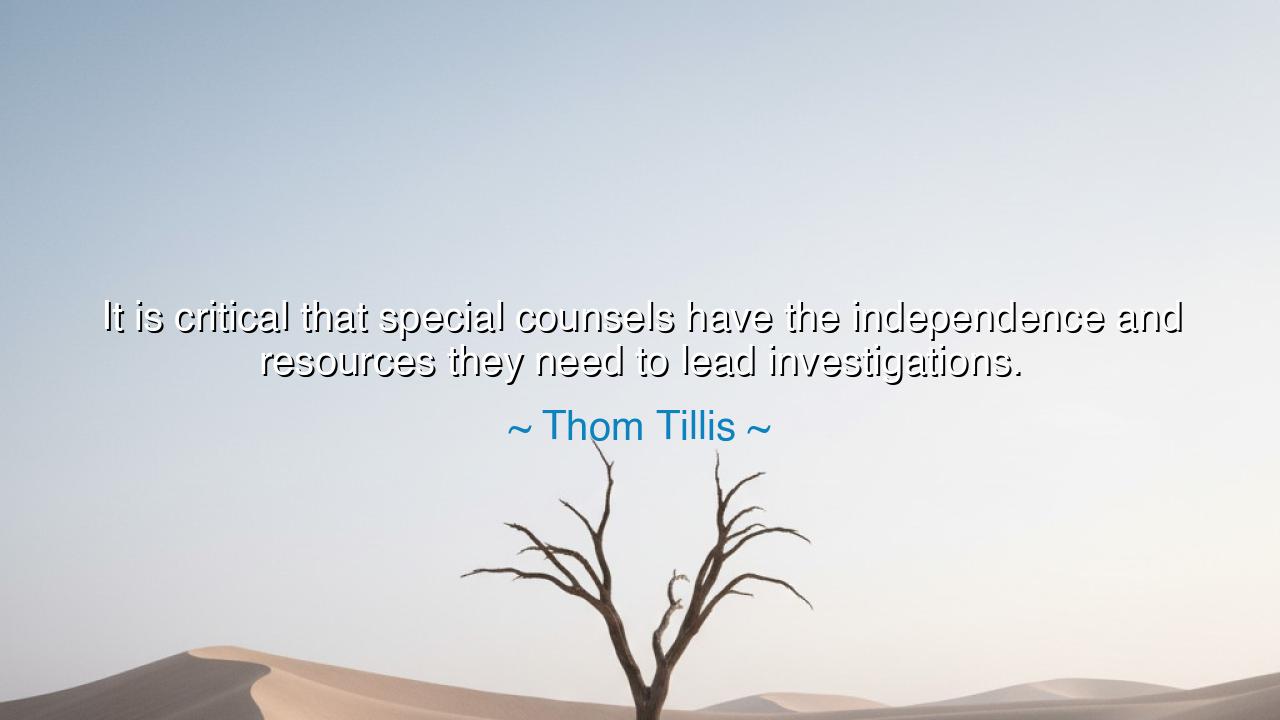
It is critical that special counsels have the independence and
It is critical that special counsels have the independence and resources they need to lead investigations.






The words of Thom Tillis, when he declared, “It is critical that special counsels have the independence and resources they need to lead investigations,” echo with the gravity of both law and conscience. In his statement lies not merely a call for procedural fairness, but a defense of the very soul of democracy — the principle that truth must never kneel before power. These words, though uttered in a modern age, bear the timeless weight of an idea as old as civilization itself: that justice cannot exist without independence, and that power unrestrained by truth leads not to order, but to tyranny.
When Tillis speaks of special counsels, he invokes those rare guardians within the structure of governance who stand apart from the machinery they must judge. They are the watchers of the powerful, the seekers of truth in places where influence casts deep shadows. Their strength lies not in the authority granted to them, but in the independence that protects them. For if the seeker of truth is bound by fear, or constrained by those he must hold accountable, then the pursuit of justice becomes but a performance, and the law a mask for deceit. Thus, Tillis reminds us that independence is not a privilege for such counsels — it is their lifeblood.
Throughout the annals of history, the same truth has been written again and again: when those who investigate corruption lose their freedom, the people lose their faith. Consider the tale of Sir Thomas More, the English statesman who served under King Henry VIII. When the king demanded that More bend his conscience to royal will, More refused — for he believed that law must stand above the desires of men, even kings. His defiance cost him his life, yet his example endures as a symbol of incorruptible integrity. More stood alone, but his stand fortified the moral foundation of justice for generations. He was, in spirit, the very embodiment of what Tillis calls for — a man with the independence and courage to lead an inquiry wherever truth may lead, even to peril.
The wisdom of Tillis’s words also reminds us of the fragile balance that sustains republics. A nation may build grand institutions, adorn them with laws, and fill their halls with learned men and women, but if resources are withheld from those who must guard justice, their strength withers. For what use is independence without the tools to act? A truth-teller without means is like a soldier without sword or shield — noble, yet powerless. Thus, the call for resources is not mere bureaucracy; it is the recognition that justice must be equipped to prevail against corruption’s cunning. A starving watchman cannot protect the gate, and an unfunded inquiry cannot uncover the truth.
We see this lesson reflected in the story of Archibald Cox, the special prosecutor appointed during the Watergate scandal of 1973. When the powers of the land sought to obstruct his investigation, he refused to yield. In what history now calls the Saturday Night Massacre, Cox was dismissed for his defiance, and high-ranking officials resigned in protest. Yet though he was silenced, the truth he pursued could not be buried. His courage — his unwavering independence — set in motion the events that restored accountability to the highest office in the land. Cox’s legacy stands as living proof that a single, principled investigator, armed with freedom and conviction, can shake the throne of corruption itself.
But Tillis’s words do not apply only to politics; they speak to every soul that bears responsibility for truth in any realm — the teacher who speaks against ignorance, the journalist who exposes deceit, the worker who defends fairness in the face of power. In all these, the principle is the same: independence must be safeguarded, for it is the root of all integrity. Without it, truth bends to convenience, and courage gives way to silence. Independence, in its deepest sense, is not isolation, but moral clarity — the will to act rightly even when comfort whispers otherwise.
So, O listener, take this teaching as a charge to your own heart. Whether you stand in a courtroom, a classroom, or the quiet corridors of your daily life, remember that justice depends on the courage to remain free — free in thought, in speech, and in conscience. Demand independence not only for those who govern, but for yourself. Speak truth even when it trembles on your lips. Support those who guard the light of honesty against the encroaching dark. For when freedom of inquiry dies, tyranny begins its march — silent at first, then unstoppable.
Thus, the wisdom of Thom Tillis endures: that independence and resources are not luxuries of justice, but its very foundation. A society that values truth must protect those who pursue it, lest its words of freedom become empty sound. For as long as there are voices that remain unbought and unafraid, the flame of justice will never die. Let that flame burn within each of us — that in every age, truth may find its champions, and freedom its guardians.






AAdministratorAdministrator
Welcome, honored guests. Please leave a comment, we will respond soon